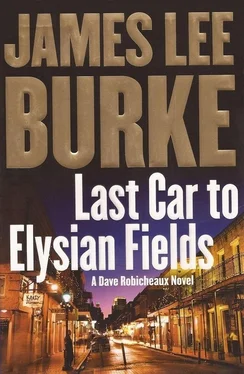I stood up and looked closer at the picture. It was inscribed “To Katie Gee, the girl who made my own screen role a real pleasure, Your pal, Phil.”
“That’s Gunner Ardoin,” I said.
“‘Gunner’ is his nickname. Phil is his real name. You know him?” she said.
“He was involved with the beating of a priest in New Orleans. You made a film with him?” I said.
She frowned, unable to process all that she just heard. “I made just one film. My screen name is Katie Gee. The producer said “Gee’ looks better than “Goltz’ on the credits. Phil was my costar What was that about a priest?” she said.
“You were in one of Fat Sammy Figorelli’s porn films?” Clete said.
“They’re art films. They’re shown in art theaters. Listen, nobody has hurt my little boy. I wouldn’t let that happen. I have to go to the washateria now,” she said.
There seemed nothing left to say. Her mindset, formed out of either desperation, ignorance, or just plain stupidity and selfishness, was armor-plated, and in all probability no amount of attrition in her life or her son’s would ever change it.
Bobby Joe Fontenot pulled up outside, wearing a foam-rubber collar, his face marbled with bruises. When the little boy got out of his car, Bobby Joe cocked his index finger at him, as though he were pointing a gun, and said, “Come over and watch some TV tonight. I got some Popsicles.”
Clete and I got up to go, our mission by and large a failure. Her son rushed past us into his bedroom, a new comic book rolled tightly in his hand. Clete twisted the handle on the front door, then stopped and turned around. “It’s not coincidence you let that geek be alone with your kid. There’s a financial motive here, isn’t there?” he said.
“Coincidence?” she said.
“You’ve got more than a neighborly relationship with that asshole next door. He knows you were working the trade around Folk Polk,” Clete said, tapping the air with one finger. “Fontenot’s in porn films, too, isn’t he?”
“I’m not saying any more. I have to go to the washateria and fix lunch and do all kinds of things I don’t get no help with. Why don’t y’all just leave now? I didn’t do anything to cause this, and you can’t say I did,” she said.
She stared at us indignantly, her arms folded across her breasts, as though the irrefutability of her logic should have been obvious to anyone.
Clete and I crossed the Teche on the drawbridge behind the trailer court and headed toward New Iberia on the back road, past the row of oak-shaded antebellum homes that belonged on a movie set. Then he mashed on the gas, one hand on top of the steering wheel, the sugarcane fields racing past us, a crazy light in his eyes.
“What are you thinking about, Clete?”
“Nothing. I’ll drop you off,” he said.
“Clete?”
“Everything is copacetic. Just hang loose. I’ll check in with you later,” he said. He whistled an aimless tune under his breath.
At 10:15 Monday morning I received a call from Clotile Arceneaux. “Did you hear from the FBI yet?” she asked.
“No,” I said.
“You will. They just left here. They want to put a net over Max Coll real bad,” she said.
“A guy crossing state lines to commit a homicide? I guess they would.”
“No, you’ve got it wrong. It’s face-saving time. Because he’s IRA, he’s on a terrorist watch list. In fact, he’s been on one for three years. Except he’s been going back and forth across the Canadian border like a yo-yo, making a lot of people look like shit.”
“That’s their problem,” I said.
“You’re not hearing me. The Feds believe Coll is ...” She paused and I heard her shuffling papers around. “They say he’s a nonpathological compulsive-obsessive with paranoid and antisocial tendencies.”
“Antisocial tendencies? This is the kind of crap that comes out of Quantico. Don’t buy into it.”
“Will you shut up? They’re saying Coll kills people because he feels he has a right to. He’s not a psychopath or a schizophrenic or anything like that. He’s just a very angry man. Have I got your attention?”
“Yes,” I said.
“He had a wife and son in Belfast nobody in law enforcement knew about.
They used a different name so Coil’s enemies wouldn’t find them. But about five years ago a Protestant death squad of some kind put a bomb under their car and killed both of them. They were on their way to Mass.”
The subject wasn’t funny anymore.
“Is there a tap on my home phone?” I asked.
“We’re in the George W. Bush era. I’d keep that in mind,” she said.
Fifteen minutes later Helen came into my office, a clutch of fax sheets in her hand. “Did you hear anything about an explosion on the drawbridge in Jeanerette?” she asked.
“No,” I said.
She sat on the corner of my desk and studied the fax sheets in her hand. “This is from the St. Mary’s sheriff’s office. See what you think,” she said. Her jawbone flexed against her cheek.
I took the sheets from her hand and read them, trying not to show any expression. The details of the investigator’s report were incredible.
In the early A.M. someone had evidently slim-jimmed a wrecker that was parked in a filling station located a half block from the trailer court by the Jeanerette drawbridge. After hot-wiring the ignition, the perpetrator drove the wrecker down to the trailer court, hooked up the winch to a trailer owned by one Bobby Joe Fontenot, and ripped it off its cinder blocks, tearing loose all the plumbing, electrical, phone and cable connections.
According to witnesses, the owner tried to exit the trailer but discovered the door had been sealed shut with a bonding adhesive used to repair the bodies of wrecked automobiles. The perpetrator skidded the trailer out of the court onto the surfaced road, bouncing it across a drainage ditch, smashing mailboxes and parked cars. When the trailer toppled on its side, witnesses thought they saw the owner trying to climb out of an exposed window. But the driver of the wrecker accelerated, knocking Fontenot, the owner, back inside. The driver then dragged the trailer across the steel grid of the drawbridge, geysering rooster-tails of sparks in the darkness.
A liquid blue flame enveloped one of the butane tanks on the rear of the trailer. The explosion that ensued blew burning paper, fabric, and particle board all over the bayou. The owner, who by this time had broken out a window and cleaned the glass from the frame with a hammer, barely escaped with his life.
The perpetrator abandoned the wrecker and burning trailer, which was tightly wedged between the steel side beams on the bridge, and disappeared into the darkness on the far side of the bayou. A moment later an ancient Cadillac convertible was seen speeding down the road toward New Iberia, the engine misfiring, leaking oil smoke, the driver wearing a small, short-brim hat perched on the front of his head.
“Wow, that’s something, isn’t it?” I said, handing the fax sheets back to Helen.
“Any idea who could pull a stunt like that?” she said.
“There’re a lot of old gas guzzlers like that around,” I replied, my eyes drifting around the room.
“Right,” she said.
“No mention of the Cadillac’s color?”
“Nope,” she said.
“It’s not in our jurisdiction, anyway. Let St. Mary Parish do some work for a change.”
“You get Clete Purcel in here right now,” she said.
But Clete did not answer his phone, and when I drove by the motor court, the manager told me he had not seen Clete’s car in the last day or two. I called Clete’s office in New Orleans. The temporary secretary he sometimes used was an ex-nun by the name of Alice Werenhaus who put the fear of God in some of Clete’s clients.
Читать дальше












